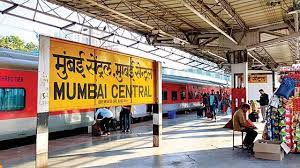


In a bid to honor Mumbai’s rich cultural heritage and shake off the vestiges of colonial influence, the Maharashtra government, under the leadership of Chief Minister Eknath Shinde, has greenlit the renaming of eight local railway stations in the bustling metropolis. Spearheaded by Shiv Sena MP Rahul Shewale, this move marks a significant step towards reclaiming the city’s identity and reflecting the sentiments of its people. The proposal to rename these stations stems from a desire to replace colonial-era nomenclature with names that better resonate with Mumbai’s diverse and vibrant culture. As reported by Times Now, Chief Minister Shinde has expressed his support for the initiative, underscoring the importance of adopting names that hold significance within the city’s historical and cultural tapestry.
Among the stations slated for renaming are:
These stations, dating back to the colonial era, are set to undergo transformations that reflect their local relevance and historical roots. For instance, Curry Road is proposed to be renamed Lalbaug, paying homage to the iconic neighborhood known for its vibrant festivities and cultural landmarks. Similarly, Marine Lines is set to be rechristened Mumbadevi, honoring the revered deity after whom the city itself is named. This shift not only celebrates Mumbai’s deep-rooted spiritual heritage but also serves as a symbolic gesture towards reclaiming indigenous identities. However, amidst the fervor for change, voices of dissent have emerged. Bharat Gothoskar, founder of the Khaki Heritage Foundation, has cautioned against hastily altering the names of landmarks with historical significance. He argues that while some stations bear colonial connotations, others like Charni Road hold origins rooted in Marathi language and local customs.

Nevertheless, proponents of the renaming initiative stress the importance of acknowledging India’s sovereignty and shedding symbols of colonialism. By embracing names that reflect Mumbai’s cultural ethos, the city takes a decisive step towards reclaiming its narrative and asserting its identity on the global stage. The renaming of railway stations is not a novel concept in Mumbai’s urban landscape. In 2017, the Union government led the charge by renaming Elphinstone Road station to Prabhadevi, honoring the nearby temple and eschewing its colonial association. Similarly, the iconic Chhatrapati Shivaji Terminus underwent a transformation, incorporating the honorific ‘Maharaj’ to reflect the revered stature of the Maratha warrior king.
The proposed name changes extend beyond mere linguistic alterations; they signify a broader cultural shift towards embracing indigenous identities and commemorating local heritage. From Lalbaug to Mumbadevi, each new name serves as a testament to Mumbai’s multifaceted identity and storied past. Moreover, the renaming initiative aligns with broader efforts across the nation to shed colonial legacies and embrace indigenous pride. As the Maharashtra government moves forward with its proposal, it sends a powerful message of inclusivity and cultural resurgence. It is important to note that the renaming process is not without its complexities. Beyond the logistical considerations, such as updating signage and official documents, there are nuanced debates surrounding the historical significance of each name. While some advocate for preserving colonial-era names as part of Mumbai’s historical narrative, others emphasize the need for names that reflect contemporary values and aspirations.
Ultimately, the renaming of railway stations in Mumbai represents a pivotal moment in the city’s ongoing journey towards self-definition and cultural empowerment. By reclaiming its narrative one station at a time, Mumbai asserts itself as a vibrant melting pot of tradition, modernity, and resilience. In the coming days, as the proposal makes its way to the central government for final approval, it is poised to spark further dialogue and reflection on Mumbai’s identity and its place in the ever-evolving tapestry of Indian culture. As the city navigates the winds of change, one thing remains certain: Mumbai’s spirit, rooted in its rich history and boundless dynamism, will continue to thrive and inspire generations to come.
News Articles
Other Real Estate News Articles